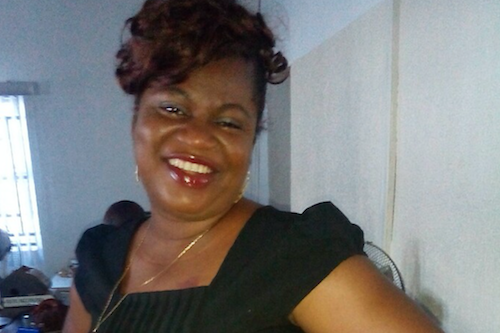Olivia Onyemaobi — Improving Menstrual Hygiene in Africa
This is part of our 2016 Radiant Health Women of Action series….

This is part of our 2016 Radiant Health Women of Action series. The Radiant Health Women of Action is our annual highlight of inspiring African women taking action and doing remarkable work to improve the health and well-being of Africans.
During her days working at a commercial bank in Nigeria, Olivia Onyemaobi would spend her one-hour break speaking to girls in schools. She had always been interested in empowering girls. At age 20, she published More about Girls, a book that addresses feminine issues.
In time, Onyemaobi noticed a disturbing trend — girls were being sexually abused because they needed money for basic necessities such as menstrual pads. In October 2015, with her team of volunteers, she started a campaign against child sexual abuse.
“We educated and rehabilitated children, especially the ones suffering from sexual trauma. We also reached parents through religious and social organizations.” Onyemaobi and her team counseled over 1500 girls in 10 days, and made shocking discoveries. Seventy-five percent of the girls regretted being girls because they menstruate, 68 percent had suffered infections due to the use of unhygienic materials during menstruation, and 79 percent were absent from school during menstruation. That was when Onyemaobi had a lightbulb moment that gave birth to Pad-Up Creations.
Pad-Up Creations is a social enterprise manufacturing hygienic female sanitary products such as panty liners and pads. The washable and reusable pads are 100 percent chemical-free. Onyemaobi believes that good menstrual health is key for young girls and women. During her research on menstrual hygiene, she discovered that some women are exposed to irritation, rashes, toxic shock syndrome, urinary tract infections and other health issues due to the presence of dioxins in disposable pads. In contrast, Pad-Up pads are made from natural materials.
“They are breathable, leak proof with protective wings and locks underneath the pant. They are manufactured under uncompromising quality control.” Onyemaobi says the pads can last up to eight hours in one use, and can be re-used for one year.
“It is the most affordable, healthy and eco-friendly menstrual solution,” says Onyemaobi, who believes that girls should not have to spend so much on pads to cater to a natural biological occurrence.
She pitched the idea to the Tony Elumelu Entrepreneurship Programme in late 2015, and it was among the 1,000 proposals selected out of over 45,000 submitted from across Africa. Pad-Up Creations just started operations in July 2016, and they have been busy; in only two months, over 20,000 packs of pads have been sold in Nigeria and beyond — to Sierra Leone, Ghana, Rwanda and Zambia.
Onyemaobi says that beyond increased access to pads, more needs to be done to make the menstrual experience better for girls, and that schools and the government need to do more to increase menstrual hygiene.
“Menstruation is a natural event. Yet, schools lack good toilets. I think the government should fix the facilities and provide water in schools to encourage good menstrual hygiene,” she says.
Onyemaobi may not be able to fix the toilets, but she is recruiting 2,000 female psych guides who will be trained and assigned to visit schools and teenage gatherings. The guides will educate girls about their bodies and menstrual hygiene.
Onyemaobi has big aspirations for her creation.
“In five years, Pad-Up Creations will affect the lives of 15 million girls and women in Africa. We will become a household name in Africa and beyond,” she says, confidence rising in her voice.
